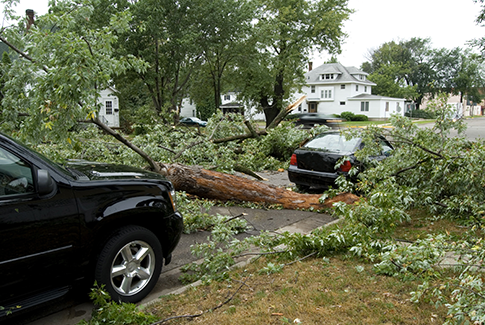Thunderstorms, hailstorms and violent winds: how can the worst be prevented?

Quebec can't escape the dramatic effects of global warming. Hailstorms, high winds tornadoes, and violent thunderstorms have become increasingly frequent, sometimes causing heavy damage. This makes it important to protect your property against assaults by Mother Nature.
What can be done before a storm to preventamage?
The first thing to do is to keep an eye on the alerts that are issued in case of extreme weather. Knowing there’s a severe storm or risk of tornadoes in the forecast will help you be better prepared. First gather all the members of your family—including pets—inside your home and make sure everything looks ok in the house. Make sure roofing components are properly fastened, and caulk any openings (windows, light shafts, skylights) where necessary to avoid water infiltration. Put away any outdoor items that could be carried off by the wind, such as the barbecue, garden furniture or garbage bins. Gutters should be clean and able to divert water easily. If you cannot find an indoor parking spot in anticipation of the storm, park your car well away from trees, lampposts and electrical wires.
Take shelter during the storm

In case of a violent thunderstorm, hailstorm or strong gusts, it’s best to stay indoors and keep doors and windows firmly shut. Consider unplugging your electric appliances, which could be damaged in case of overload. Computer use is highly inadvisable, as is landline telephone use. If you’re concerned about the impact of heavy winds or a tornado, stay away from windows and head to a safe place, such as the basement or a small room on the ground floor (e.g., a closet or bathroom).
Motorists caught in a violent storm can stay inside their vehicle without fear, but it’s best to find a secure place to park while waiting for the storm to abate.
Does home and car insurance cover hail or wind damage?
Home insurance provides coverage against severe thunderstorms, lightning, wind, tornadoes, and hail storms. In addition, if an evacuation order is issued and you’re covered for damage caused by a tornado, you may be reimbursed for additional living expenses for 14 days, depending on the terms of your insurance policy. These additional expenses represent the costs incurred because you are unable to live in your home.
If your home has suffered damage that is covered and requires you to temporarily relocate, you will be entitled to reimbursement of these expenses for a set period of time, based on the terms of your insurance policy.
Is your car damaged? You’ll be entitled to compensation if you’ve added “coverage for damage to insured vehicles” (Chapter B) to your car insurance policy. In either case, you’ll have to pay the deductible set out in your contract, unless your vehicle has sustained damage caused directly by lightning or fire.
No matter how prepared you are, extreme weather conditions can sometimes still leave a mark. If so, the first things you need to do are contact your insurer, secure your home, and pick up any debris on your property to avoid accidents or additional damage. Take photos and write down any items that need to be replaced, cleaned, or repaired by professionals.
The neighbour’s tree damaged my car. Who has to pay?
Contrary to what you may think, it’s the person who suffered the damage who has to foot the bill, unless it can be proven that the incident was due to faulty maintenance or negligence by the neighbour.

Protect your home
See how CAA-Quebec Home Insurance can meet all your needs.